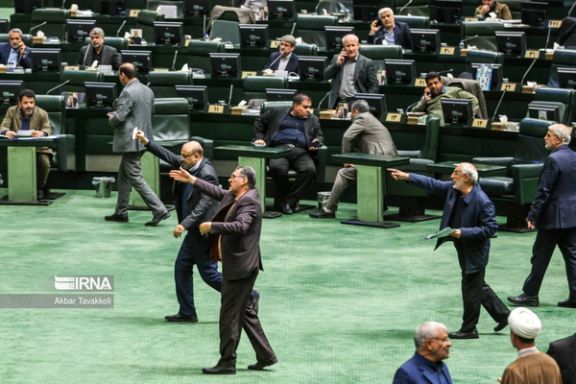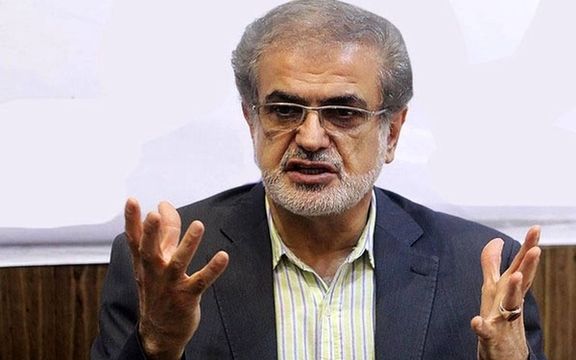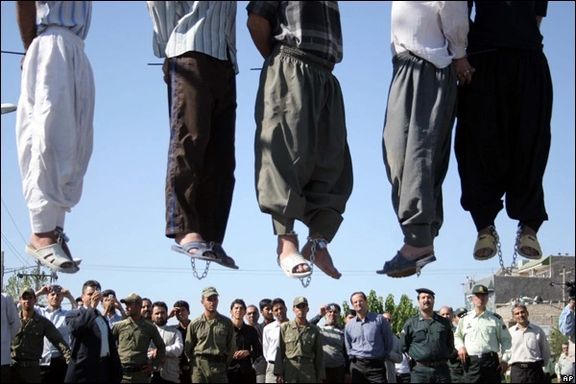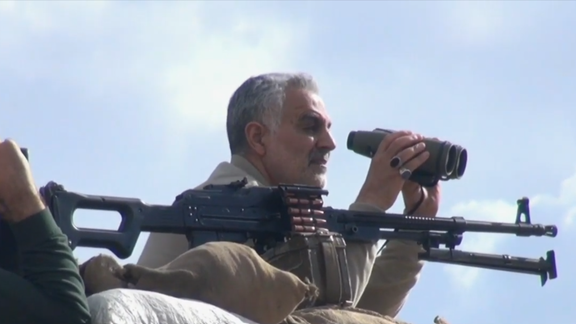Hackers Claim Responsibility For Disruption At Gas Stations Across Iran

A hacking group known for targeting government facilities in Iran has claimed responsibility for a nationwide attack disrupting gas stations on Monday.

A hacking group known for targeting government facilities in Iran has claimed responsibility for a nationwide attack disrupting gas stations on Monday.
The group provided technical details on their Telegram channel, warning Iranian leadership. Iranian state TV reported disruptions in services at numerous gas stations in the capital, with the cause yet to be determined.
Oil Minister Javad Owji earlier told Iranian state TV that services had been disrupted at about 70% of Iran's pumps and that outside interference was a possible cause.
The IRGC-affiliated Fars news agency linked the issue to a widespread software malfunction affecting gas stations. Reza Navar, spokesperson for Iran’s gas stations association, claimed experts are addressing the problem. However, he did not specify the extent of the disruption or the number of affected stations.
Navar said that there is no shortage of fuel supply and urged drivers to avoid gas stations until the issue is resolved.
The hacking group "Gonjeshk-e-Darande" or Predatory Sparrow gained notoriety two years ago for a cyber attack on fuel distribution centers across Iran on the eve of the second anniversary of the suppression of the November 2019 protests. In a separate incident, they claimed responsibility for hacking the railway company.
Last year, the group reported hacking into the computer systems of major steel companies in Iran and released videos and images of the hacking operation.
Iran has a history of cyber incidents, with one of the most notable being the Stuxnet computer virus, believed to have been developed by the United States and Israel. The Stuxnet virus, discovered in 2010, was used to attack an Iranian uranium enrichment facility, marking the first publicly known instance of a virus being utilized to sabotage industrial machinery.

Amid reports of a possible US strike on Iran-backed Houthis, IRGC’s commander-in-chief taunted Americans on Sunday, claiming that they’d leave the region soon.
“The US and Israel are reliving their bitter experiences,” said Maj. Gen. Hossein Salami. “Did they find victory in their occupation of Afghanistan? Were they able to stay in Iraq after its occupation? They are gradually packing up to leave this land.”
Iranian officials have been increasingly bullish in the past few weeks, banking, it seems, on the Biden administration’s apparent reluctance to confront the regime and its proxies in the Middle East.
Since mid-October, Iran-backed militias have launched 100 attacks on US bases (or interests) in Iraq and Syria, while Yemen's Houthis –with Iranian drones and missiles– have forced five shipping giants to halt their traffic in the Red Sea, a major artery for global commerce.
The US response has been limited and largely defensive. A few IRGC-affiliated positions in Iraq and Syria have been targeted and some drones have been shot down before hitting commercial vessels or US warships. But the option of striking the Houthis has been crossed out so far by the Biden administration.
Instead, the US is trying to build an expanded maritime force involving Arab and other states to protect commercial shipping at the Red Sea, according to the Guardian.
The joint task force is yet to be announced. Whatever its brief, it’s hard to imagine the Arab states footing the Houthi bill, especially since the group has repeatedly (and starkly) warned against any such move. Even if a coalition is formed, the burden of military operation would fall on the United States and the alliance would remain a defensive force.
“If Saudi Arabia or UAE are part of a US coalition to bomb Yemen then we will destroy their oil and gas fields, " a Houthi spokesman said to France 24 earlier this month.
Houthis say they would continue their operations as long as Israel continues its bombardment of Gaza, in which the US government is seen as complicit.
“Muslim nations hold an endless grudge against these criminals and US officials don’t dare visit Islamic lands,” General Salami said, just hours before US Secretary of Defense Lloyd Austin arrived in Bahrain for his multi-day tour of the Middle East.
Austin will also visit Qatar and Israel, reportedly to continue discussing a timetable for ending the war’s most intense phase and define milestones for the war with Hamas.
On Monday, the UN security council will vote on a new resolution calling for an “urgent and sustainable cessation of hostilities” in Gaza –only days after President Biden warned Israel that it risked losing international support due to its “indiscriminate” bombing and killing of Palestinians.
Thousands of civilians have been killed in the Israeli onslaught on Gaza, which has flattened large parts of the Strip and displaced 85 percent of the population, according to international organizations.
“We will stand with the beloved Palestine to the end,” Salami said Saturday, betraying the fact that the regime in Iran sees the current conflict as a battle in a much longer war, in which the main objective is not military gains but to isolate Israel and raise Hamas’ standing among Palestinians.
And to that end, Salami and his allies can see some success, if not victory.
“Israel will not win this war if its operations destroy the prospect of peaceful co-existence with Palestinians,” David Cameron and Annalena Baerbock, the foreign ministers of the UK and Germany, wrote in the UK's Sunday Times.
Lending their voice to growing calls for a “sustainable” cease-fire, they said “the sooner it comes, the better. The need is urgent.”
The Israeli government, however, seems to be determined to continue fighting to dismantle Hamas. An Israeli military spokesman said on Monday, “it is important for me to make clear, the IDF [Israel army] is determined to complete the task of dismantling Hamas.

A prominent reformist in Iran says hardliners are "tearing each other apart" over financial gains after pushing reformists out of the upcoming parliamentary elections.
Ali Soufi, a minister and top-level official in reformist President Mohammad Khatami's fist government (1997-2005) told Rouydad24 website that "There is an escalation in infighting over financial gains among Iran's conservatives now that they do not have to worry about competing with reformists in the upcoming elections."
He cited the recent scandal involving a $3.7 billion embezzlement in Iran's tea industry as an example of this infighting. Soufi emphasized that conservatives have gained greater access to the country's financial resources following their consolidation of power within the Iranian political system.
Soufi contended that such a situation often fosters financial corruption, as experienced during President Mahmoud Ahmadinejad's administration. He further alleged that conservatives frequently disregard the law and exploit religious canon, Sharia, to evade it. Conservative groups compete to secure the largest share of the country's resources by exposing each other's activities.
Eighty percent of Iran’s economy is controlled by the government and entities linked with the clerical regime. This makes it possible for insiders to use political power for financial gains.

Speaking about the elections, Soufi said that there is a war going on between the Raisi Administration and the security forces. The government aims to give control of parliament entirely to the ultraconservative party Paydari. A government monopolized by hardliners will lead to nothing other than treason and corruption, he said.
While some conservative activists have alleged that reformists have secretly prepared a list of candidates for the parliamentary election in March 2024, reformist figure Mahmoud Mirlohi has denied this claim. He argued that when former lawmakers such as reformist Massoud Pezeshkian and moderate conservative Ali Motahari have their qualifications as candidates rejected by the Interior Ministry, it seems absurd to suggest that reformists have prepared a candidate list.
Although the government may not want a high-turnout election, Iran's Interior Minister Ahmad Vahidi has stated that it is the United States that aims to dissuade Iranians from participating in the upcoming parliamentary elections. However, Vahidi did not explain how or why the United States would pursue such a plan.
On the ground, however, if there is any indication of Iranian reformists' activity ahead of the elections, it must be among the centrists. Based on an analysis published by conservative Nameh News, the centrist Executives of Construction Party is likely to go its separate ways from other reformists and moderates who have been thinking of boycotting the elections. They did the same in the previous elections in 2021 but won only less than 2.5 percent of the votes, their critics have said.
Furthermore, developments within the far-left Unity of the Nation party suggest that some members have proposed replacing Azar Mansouri, the leader of the Reform Front, with a male politician who supports participating in the election, such as Behzad Nabavi. Other members in the front have denied any change in its leadership.

The Iran Human Rights Organization (IHRNGO) has issued a report sounding the alarm about the rising threat of more executions in Iran coinciding with the Christmas holidays.
On Saturday, the organization based in Norway also reported that the execution of Samira Sabzian is expected to take place in the upcoming days. Initially scheduled for December 13, her execution for the alleged murder of her husband was deferred by a week. Samira, who was married as a child, has been on death row for a decade.
IHRNGO is calling on the public, civil society, and the international community to intervene and prevent the executions of Samira and other individuals on death row by engaging in anti-death penalty campaigns and political actions. Director Mahmood Amiry-Moghaddam expressed apprehension about the average of over four executions per day in the past week, stressing the need for the global community to speak out. He voiced concerns that, during the Christmas and New Year holidays, when many parts of the world are on vacation, more individuals may face the risk of execution.
“During this time, particularly individuals such as women, juvenile offenders, protesters, and political prisoners whose executions could elicit stronger reactions under normal circumstances are at greater risk.”
The Mizan news agency of Iran's notorious judiciary also announced the execution of an unnamed man on December 16 in Zahedan Central Prison, citing "links with foreign services, including Mossad." The timing of the execution, occurring a day after the armed attack on the Rask police headquarters, raises suspicions of it being retaliatory.
Iran Human Rights has documented a total of 31 executions between December 9 and December 16, 2023.

One of Iran’s cyber espionage tactics to support Hamas is using Hebrew-speaking women to gather intelligence from Israeli soldiers, Iran International has learned.
According to our sources, several of these women are based in the religious city of Mashhad in northeastern Iran and use social media to seduce Israeli soldiers by sending nude images or provocative footage of themselves in an effort to gather military intelligence.
While the screen names and details of these women are presumably fake, the explicit photos and videos they shared with Israeli soldiers appear to be genuine. To entice their victims, these cyber operatives sent photos and videos of themselves wearing revealing clothing, heavy makeup, and, in some cases, nude photos.
According to Iran International's investigations, members of this IRGC-run catfishing cell use a wide range of fake profiles across various online platforms, managing at least 22 different avatars in some instances.

Two of these Mashhad-based 'swallows', identified as Samira Baghbani Torshizi and Haniyeh Ghaffarian, used their real pictures but posed as Israeli soldiers in their attempt to seduce and extract information from real Israeli soldiers. Torshizi, whose screen name was “Or Olga,” had claimed to be a Jewish immigrant residing in London. She had asked a soldier if she could see pictures of a vehicle he used in the army, wondering if “it is secret or classified.”
Ghaffarian had also tried to make an emotional bond with an Israeli soldier through sending photos and videos of herself.
Last month, the IDF announced that it foiled a network of Hamas supporters using fake social media profiles to extract information from the IDF forces, including information on the units that would be sent into the Gaza Strip and the timing of dispatches or operations underway as part of the Israel’s offensive against Iran-backed Islamist militia Hamas.
The accounts made contact with troops and “managed a kind of romantic relationship… through correspondence, voice recordings and video calls” in order to gather information for Hamas, the IDF said. The number of potential victims was estimated to be between hundreds and thousands of soldiers, including reservists. The IDF said the faux social media profiles had additional fake profiles posing as relatives and friends, in order to “strengthen their credibility.”
"In one case, the operative asked for the name of the soldier’s base and inquired, 'When are you entering Gaza?' In another instance, a profile named 'Shira Simon' claimed to be an intelligence officer to an officer in the Givati brigade, subsequently asking why he was on a base in the Golan Heights. The soldier replied that he was there for training."
Last year, Israel's internal security service Shin Bet also revealed a similar case, an Iranian operator working under the name of Sara Puppi, pretending to be a young Jewish girl with connections and business in Israel. In February, Twitter and Facebook suspended pages and profiles of an Iranian disinformation unit that was targeting nationalist and ultra-religious Jews in Israel.
Sexpionage is a historically documented phenomenon and was one of the methods of choice for the Soviet intelligence. In the Soviet Union, female agents tasked with employing such tactics were called 'swallows,' while their male counterparts were referred to as 'ravens.' The Islamic Republic has famously used swallows to honeytrap or blackmail its critical figures.
In one of the major recent cases, Iran’s intelligence apparatus used one of these so-called swallows to lure and consequently abduct Habib Asyud (also known as Habib Chaab) -- an Iranian-Arab leading separatist – in Istanbul. He was smuggled to Tehran in November 2020 and was hanged earlier this year.
Iran supports Hamas but says it did not play any role in the Islamist militants' October 7 terror attack that triggered the current crisis. Iran also backs the Hezbollah, a Lebanese militant group that has deep ties with Hamas and Islamic Jihad, another Palestinian faction in Gaza that is also backed by Iran.

Iranian vice president for legal affairs announced that the regime has initiated the process of filing a complaint for the killing of former IRGC-Quds commander Qasem Soleimani.
Soleimani was assassinated in a US drone strike near Baghdad International Airport on January 3, 2020, under the order of then-President Donald Trump.
The official, Mohammad Dehghan stated, "In April, we will register our complaint against the US government. The US government has allowed the assassination to take place against international conventions, and Trump and other US officials who violated the conventions have not been prosecuted." He emphasized that figures like Soleimani are considered internationally protected, claiming he had been on a "diplomatic mission" in Iraq at the time of the assassination.
Soleimani was the Iranian regime's top military and intelligence operative in the Middle East, establishing proxy militant groups and overseeing Iran's military involvement in Syria.
Dehghan noted a preliminary step requiring six months to pass from the time of warning the United States, and April 2024, when the complaint will be registered in The Hague.
Iranian Foreign Minister Hossein Amir-Abdollahian had previously disclosed in January that nearly 60 US officials were blacklisted by Tehran for their involvement in Soleimani's assassination.
Iran's President Ebrahim Raisi and Supreme Leader Ali Khamenei have consistently vowed revenge for the killing of Soleimani. Since Soleimani's death, a member of the Iranian Revolutionary Guard has been charged with planning to assassinate former US National Security Advisor John Bolton and former Secretary of State Mike Pompeo as retaliation for the military commander's killing.